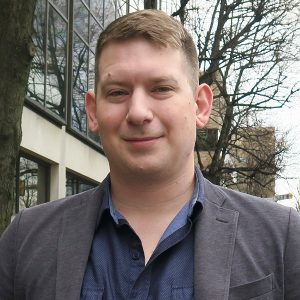Thomas Noah
PhD in Philosophy, University of Pennsylvania ’18 (expected)
Graduate Certificate in Social, Cognitive and Affective Neuroscience, University of Pennsylvania ‘12
BA in Philosophy, University of Massachusetts Boston ‘09

“When I first got to Penn, I shadowed researchers in Dr. Joe Kable’s neuroeconomics lab before starting the SCAN certificate. With SCAN, I was excited to learn more about neuroscience directly than to gather information by osmosis,” shares Thomas Noah, a current PhD candidate in philosophy. “I am interested in moral philosophy. I’m trying to show in some of my research that neuroscience can have normative implications and it can change some of the moral commitments and judgments we have, although not in ways often presupposed by many working in neuroethics.”
Thomas explains, “We can think we make decisions in a non-emotional and ‘rational’ way, but neuroscience can show that sometimes there is a low-level emotional response that influences a judgment.” He applies lessons like these to his global social work. Through his academic and professional partnership with Dr. Cristina Bicchieri, and the Penn Social Norms Group (PennSONG) Thomas has worked with UNICEF and the Gates Foundation on changing dangerous social norms and behaviors.
As a philosopher, Thomas finds there are many important intersections in his work and neuroscience, “Normativity— moral, social and practical—is something that happens in the world. We know some things are good and that we ought to do certain things. I believe that has to do with how we interact with our environment. I think neuroscience has a lot to say about that.”
Thomas has explored these questions beyond Penn, at the Morality, Moral Philosophy and the Humanities in the Age of Neuroscience conference at Kent State University as well as a National Endowment for the Humanities Summer Institute on moral philosophy and moral education at Duke University. He recalls, “When I attended those events, I was very knowledgeable in neuroscience because of the SCAN program. I had lots of productive conversations with neuroscientists, and I’m still in contact and planning projects with some of them today.”